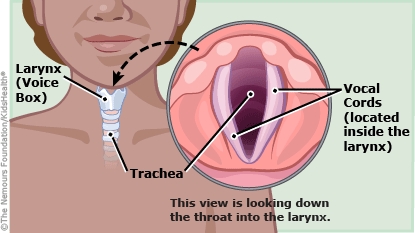Your Changing Voice
If you're going through puberty (say: PYOO-bur-tee), your voice may start squeaking and cracking. Every kid’s voice changes during puberty, but some kids’ voices change more than others. Read on to learn why this happens and what to expect.
Why Do Our Voices Change?
When you speak, air rushes from your lungs and makes your vocal cords vibrate (move back and forth). Vocal cords are thin muscles that stretch across the larynx like rubber bands. If you've ever plucked a rubber band, you've probably heard the high-pitched twang it makes when it's stretched. A thicker rubber band makes a deeper, lower-pitched twang. Your vocal cords stretch and vibrate in a similar way.

Your vocal cords are part of your larynx (say: LAIR-inks), also called your voice box. Before you hit puberty, your larynx and vocal cords are small and thin. That's why your voice is higher than an adult's.
As you go through puberty, the larynx gets bigger and the vocal cords lengthen and thicken, so your voice gets deeper. As your body adjusts to these changes, your voice may "crack" or "break." But this is temporary. When the larynx is finished growing, your voice won't make those noises anymore.
Why Do Some People Have Adam's Apples?
During puberty, the larynx tends to grow much bigger and thicker in boys than in girls, thanks to the hormone testosterone. When the larynx grows a lot bigger and thicker, it tilts to a different angle, and you can see a bump in the front of the throat. This is called the Adam's apple.
People often think of Adam’s apples as something that guys have, but remember that everyone is different — not all grown men have visible Adam’s apples while some women do. It just depends on how much your larynx grows during puberty.
When Will My Voice Change?
Everyone's timing is different, but most kids’ voices will start changing when they're between 11 and 14 years old. Some voices change quickly, while others may take a few years to finish changing.
If this hasn't happened to you yet, don't worry. And if you're going through this now, don’t stress about the funny noises you make, because this happens to everyone. It can help to talk to a parent, an older sibling, or a friend who's already gone through the voice change. Before you know it, your voice will sound clear, strong, and more adult!
